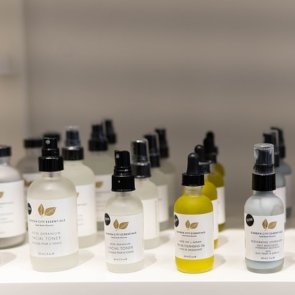5 Ingredients to Look for in a Face Serum
 A face serum is a great addition to your skincare routine when your skin needs some extra TLC. A serum is essentially a lightweight skin moisturizer packed with active ingredients, which allows it to deliver a visible effect quickly and efficiently. Here are 5 active ingredients to look for in a face serum.
A face serum is a great addition to your skincare routine when your skin needs some extra TLC. A serum is essentially a lightweight skin moisturizer packed with active ingredients, which allows it to deliver a visible effect quickly and efficiently. Here are 5 active ingredients to look for in a face serum.Retinol
Retinol is one of the many forms of vitamin A. Retinol and some of its derivatives (retinoids) are widely used in skincare products, including facial serums, because of their exfoliating, skin-smoothing, and anti-age properties.
Facial serums with retinol help get rid of dead skin cells (although if you need thorough exfoliation, you’d better use more effective chemical exfoliants like glycolic acid), boost collagen production in the skin, reduce fine lines and deeper wrinkles, prevent acne, even skin tone, and reduce pigmentation.
One thing that you need to remember about retinol is that it makes your skin more vulnerable to UV radiation. So you should combine retinol-based face serums with sunscreen and avoid spending time in the sun right after you’ve applied serum.
Vitamin C
Ascorbic acid, commonly known as vitamin C, is one of the most powerful antioxidants. The importance of antioxidants for your skin is that they combat free radicals, chemical compounds that are among the factors contributing to skin aging.
Facial serums with vitamin C are great for women in their thirties and forties. They protect the skin from environmental damage and stress, improve collagen synthesis in the epidermis, boosts the skin’s immunity, and brighten the skin, making it look glowing.
Collagen
Collagen is a structural protein that is responsible for your skin’s elasticity. As you age, your skin starts producing less collagen, which results in fine lines, wrinkles, droopy eyelids, and other signs of aging.
Anti-age face serums contain collagen in soluble form (hydrolyzed collagen) that makes up for the lack of natural collagen and improves skin structure. Such serums are designed to make the skin firmer and improve its elasticity, smooth out crow’s feet and fine lines, reduce deeper wrinkles, and slow down the aging process.
Hyaluronic Acid
Hyaluronic acid is one of the most effective hydrating ingredients. It helps trap moisture in the epidermis and thus makes sure that your skin remains hydrated at all times. In addition, hyaluronic acid plays an important role in skin healing. It boosts skin cell regeneration, protects the skin from infection, and prevents inflammation.
In facial serums, hyaluronic acid is often combined with retinol because these two ingredients are believed to balance each other out. Hyaluronic acid boosts the anti-age effect of retinol and protects the skin against sun damage.
Coenzyme Q10
Coenzyme Q10, also known as ubiquinone, plays an important role in a number of biological processes, including cellular respiration. It is widely used as a cosmetic ingredient because of its ability to reduce the appearance of wrinkles and make aged skin look younger, prevent dehydration, and stimulate skin cell regeneration.
Face serums with coenzyme Q10 typically have anti-age properties. They improve the skin’s ability to produce collagen and elastin that declines with age. As a result, your skin becomes firmer, and its elasticity and flexibility improve. In addition, coenzyme Q10 acts as a strong antioxidant, protecting your skin from free radical damage.
Of course, you probably won’t be able to find a face serum that contains all of these ingredients at the same time – but you don’t need to. Most serums contain one or two active ingredients, and you should base your choice on the effect you want to achieve, be it hydration, aging prevention, or something else.
Breadcrumbs
Filters
- Face
Tags
Related Articles
- Pros and Cons of Using Salicylic Acid for Acne-Prone Skin, 5 Ingredients to Avoid in Your Face Wash, What Is a Bubble Mask and Does It Actually Work?, What Is Oxygenating Skincare and How Does It Work?